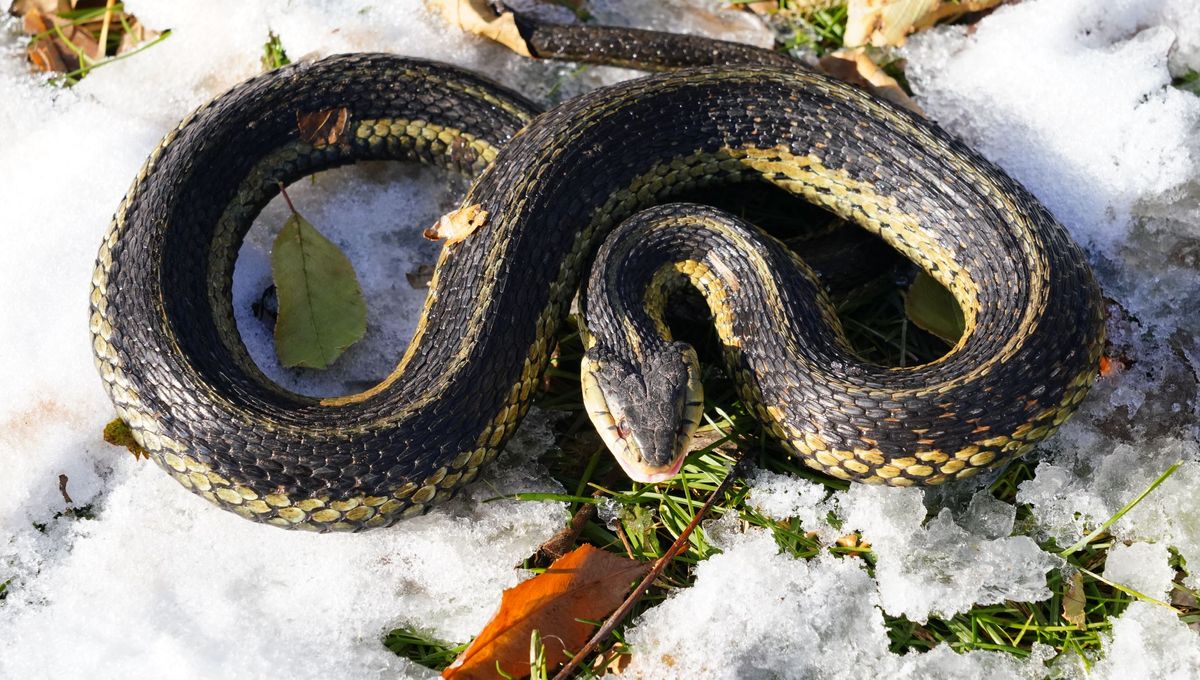
In an attempt to survive the winter months, when temperatures drop and food is scarce, a number of species will experience some form of hibernation. While true hibernation refers specifically to mammals, different taxonomic groups will experience hibernation-like processes specific to their needs, so if snakes don’t hibernate, what do they do?
Hibernation vs. brumation
As ectotherms, whose body temperature is regulated by the environment, the process of brumation enables reptiles and amphibians to survive near-freezing temperatures during the winter.
Reptiles and amphibians are poikilothermic, meaning they can withstand drastic changes in body temperature without suffering negative impacts on their organ function. This means they’re able to allow their body temperature to drop dramatically during brumation, with some species of alligator choosing to spend part of their winter submerged in frozen water.
While brumation could be considered the ectotherm’s hibernation, the processes do differ slightly based on the biology of the different groups.
Before going into hibernation, mammals will build hefty fat reserves which their body uses slowly throughout the season to sustain their deep sleep. While hibernating mammals will stay in this slumber for the entirety of the hibernation process, brumating reptiles and amphibians will sometimes slink off for a drink of water during their comparatively lighter nap.
Brumating species are also able to tolerate significantly lower oxygen levels than hibernating mammals. Lizard species like the central bearded dragon (Pogona vitticeps) will often bury themselves in wet soil to reduce the distance needed to travel for water.
As ectotherms rely on outside temperatures to digest their food, they will stop eating just before and during brumation. If an ectotherm’s stomach is full while they’re too cold to digest, the food in their stomach can rot causing impaction and infection that can be fatal.
Both brumation and hibernation differ in length depending on the species and outside temperatures, with the process lasting anywhere from a few weeks to six or seven months.
Do all snakes brumate?
In the same way that humans don’t hibernate (as much as we’d like to) despite being mammals, not all ectothermic species brumate. So not only do snakes not hibernate, many of them don’t brumate either.
Somewhat unsurprisingly, temperate-climate species don’t have the need to brumate as their environment stays comparatively warm. Some temperate-climate species, however, will experience estivation – a type of dormancy experienced during the hot, dry summer months.
All North American snake species brumate due to the region’s colder climate. Commonly kept species like garter snakes (Thamnophis), and corn snakes (Pantherophis guttatus) are known to brumate both in the wild and occasionally in captivity too.
Brumation in captivity
Despite captive individuals experiencing a mostly consistent environment, their biological functions can often kick in telling them to begin brumation despite not seeing a drop in temperature. Keepers can facilitate brumation by lowering the temperature in the snake’s enclosure, but this should always be done with caution and knowledge of proper brumation care requirements.
While it’s possible some captive snake species may attempt brumation, it’s far less common in captive snakes than it is in other commonly kept reptile species. Adult bearded dragons and many species of tortoise, for example, often brumate in captivity. Keepers of brumating species should always be aware of the signs and know how to properly facilitate this process in captivity.
Source Link: Do Snakes Hibernate?